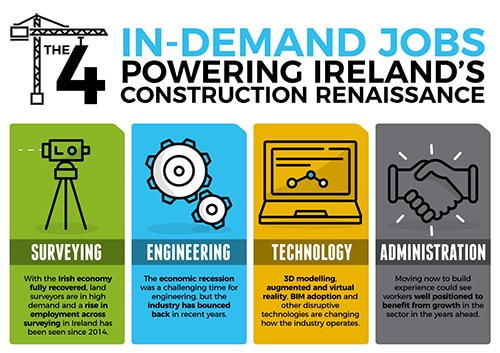The construction industry has rebounded in recent years, hiring at a rate of 1,000 additional employees a month since 2013. There is little to suggest a slowdown.
With the Government committed to delivering 47,000 social housing units up to 2021, and with an anticipated population growth of one million people over the next 20 years, the Construction Industry Federation says that close to 120,000 construction workers are now required in the sector.
These factors mean that construction companies across Ireland are looking to hire, now and in the years ahead. The supply of new entrants from college will not be enough to meet this demand. This creates opportunities for workers looking to change career, upskill or transfer to a new sector.
We’ve identified four major industry roles set for growth in the years ahead.
Surveying covers a wide range of roles, from quantity surveyors who advise on the costs of developing buildings and infrastructure, to geomatics surveyors who map the built and natural environment to provide accurate spatial data for planning, development and conservation.
The period between 2014 and 2017 saw additional employment across surveying of 2,624 with anticipated need for an additional 3,739 surveying professionals between 2018 and 2021.
The industry will look abroad to fill this need in the short-term but given the desperate need for increased construction in the years ahead, enrolling in a surveying programme could be a solid move for those looking to switch career paths.
Engineering is another profession which encompasses a wide variety of specialisations. Civil engineers, who plan and design building structures and infrastructure, are most directly involved with the construction industry.
The economic recession was a challenging time for engineering, but the industry has bounced back in recent years. As the economic recovery takes hold, engineers are in high demand with job opportunities and salaries increasing significantly. According to the Engineering 2018 report, the demand for engineering talent has seen graduate engineer salaries increase by 11% in the past four years to €31,000.
However, some engineering businesses are concerned by skills shortages. In particularly short supply are civil engineers, whose numbers have declined by 45% in the past five years. 3. Technology
3. Technology
Construction isn’t just about hard hats and building sites. Technology is transforming the way the industry works. 3D modelling augmented and virtual reality, BIM (building information modelling) adoption and other disruptive technologies are changing how the industry operates.
People with knowledge of these technologies, like programmers and computer engineers, are highly valued in the sector and will be able to command high salaries.
As construction companies grow their administration needs will grow with them. Whether in HR, office management or IT support, companies value industry-specific experience.
The demand for workers in the sector means that, for many current job postings, prior experience in construction is not a requirement. Moving now to build experience could see workers well positioned to benefit from growth in the sector in the years ahead.
IrishJobs.ie has been helping people find the job they want for over 20 years. Our team is delighted to share our job hunting tips and advice with you.
